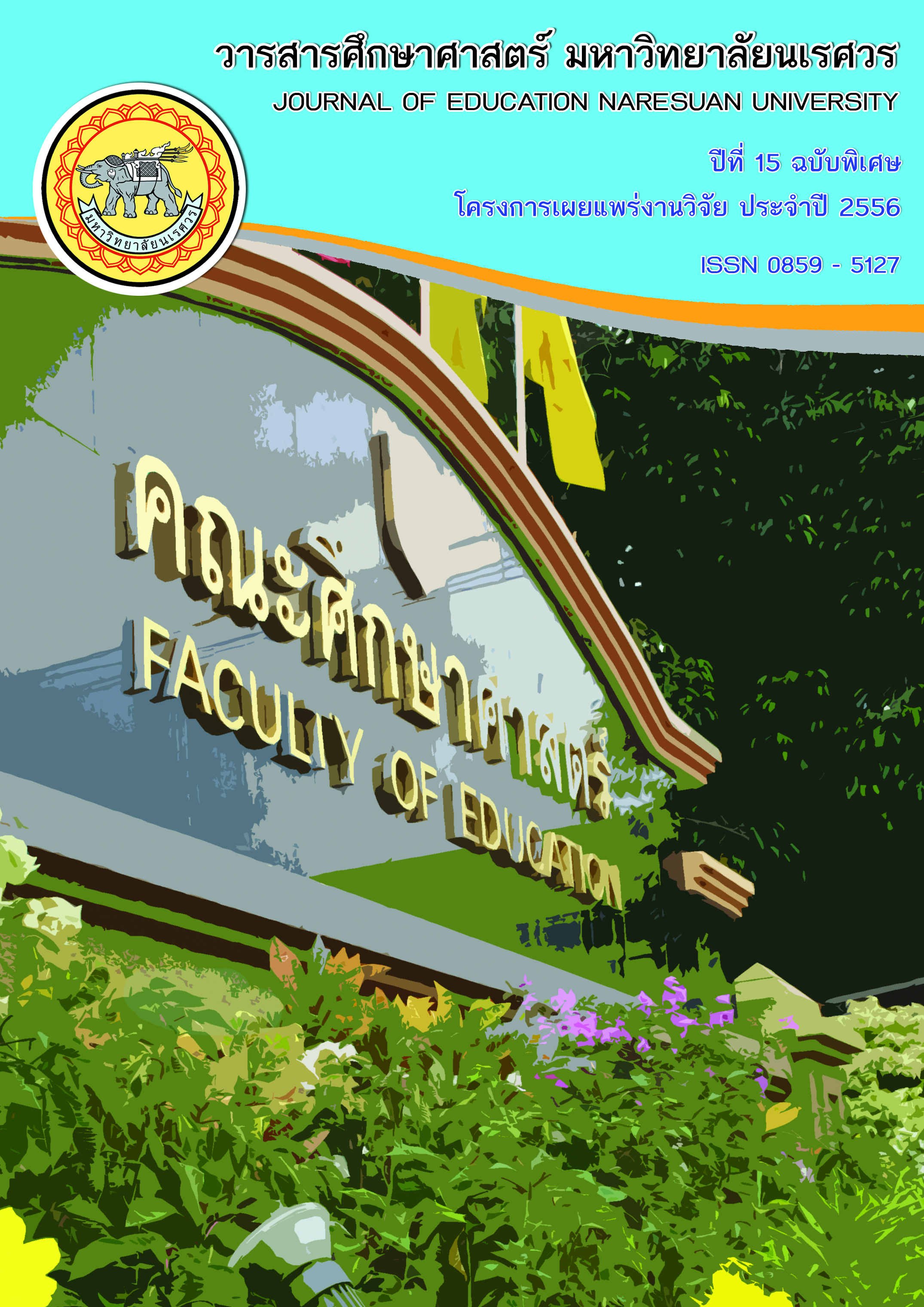การพัฒนารูปแบบการบริหารกิจกรรมเพื่อสังคมและสาธารณประโยชน์ของสถานศึกษาขั้นพื้นฐาน สังกัดสำนักงานเขตพื้นที่การศึกษาประถมศึกษา ในเขตชายแดนไทย-พม่า
Main Article Content
Abstract
บทคัดย่อ
การวิจัยครั้งนี้มีจุดมุ่งหมายเพื่อพัฒนารูปแบบการบริหารกิจกรรมเพื่อสังคมและสาธารณประโยชน์ของสถานศึกษาขั้นพื้นฐาน สังกัดสำนักงานเขตพื้นที่การศึกษาประถมศึกษา ในเขตชายแดนไทย-พม่า โดยมีจุดมุ่งหมายเฉพาะ เพื่อศึกษาสภาพและแนวทางการบริหารกิจกรรมเพื่อสังคมและสาธารณประโยชน์ในสถานศึกษาที่มีปฏิบัติการที่ดี สร้างรูปแบบการบริหารกิจกรรมเพื่อสังคมและสาธารณประโยชน์สำหรับสถานศึกษาสังกัดสำนักงานเขตพื้นที่การศึกษาประถมศึกษาในเขตชายแดนไทย-พม่า และประเมินความเหมาะสมและความเป็นไปได้ของรูปแบบที่สร้างขึ้น
ระเบียบวิธีในการวิจัย เป็นการวิจัยเชิงคุณภาพ 3 ขั้นตอน ขั้นตอนที่ 1 ศึกษาสภาพและแนวทาง การบริหารกิจกรรมเพื่อสังคมและสาธารณประโยชน์ของสถานศึกษาขั้นพื้นฐาน สังกัดสำนักงานเขตพื้นที่การศึกษาประถมศึกษาในเขตชายแดนไทย-พม่า ที่มีปฏิบัติการที่ดี ใช้วิธีสัมภาษณ์แบบกึ่งโครงสร้าง กับผู้บริหารสถานศึกษา ครู และผู้มีส่วนได้ส่วนเสียในสถานศึกษา 3 แห่ง ซึ่งเลือกตามเกณฑ์ที่ผู้วิจัยกำหนด ขั้นตอนที่ 2 สร้างรูปแบบการบริหารกิจกรรมเพื่อสังคมและสาธารณประโยชน์ของสถานศึกษาขั้นพื้นฐาน สังกัดสำนักงานเขตพื้นที่การศึกษาประถมศึกษาในเขตชายแดนไทย-พม่า โดยใช้ข้อมูลจากขั้นตอนที่ 1 จัดทำร่างรูปแบบ แล้วส่งไปให้ผู้ทรงคุณวุฒิ 24 คน ตรวจสอบความเหมาะสมของรูปแบบ โดยเทคนิคเดลฟาย สอบถาม 2 รอบ ขั้นตอนที่ 3 ประเมินประโยชน์ และความเป็นไปได้ในการนำรูปแบบไปใช้ โดยใช้เทคนิคการประชุมรับฟังความคิดเห็น จากผู้บริหารสถานศึกษา
10 คน ครู 10 คนและผู้ปกครองนักเรียน 10 คน รวม 30 คน ในสถานศึกษาสังกัดสำนักงานเขตพื้นที่การศึกษาประถมศึกษาในเขตชายแดนไทย-พม่า วิเคราะห์ข้อมูลโดยค่าเฉลี่ยและส่วนเบี่ยงเบนมาตรฐาน ผลการวิจัยพบว่า
1. สภาพการบริหารกิจกรรมเพื่อสังคมและสาธารณประโยชน์ในสถานศึกษาสังกัดสำนักงาน เขตพื้นที่การศึกษาประถมศึกษาในเขตชายแดนไทย-พม่าที่มีการปฏิบัติที่ดี คือ 1) ด้านปัจจัย มี ผู้บริหารสถานศึกษาและครูที่ให้ความสำคัญกับกิจกรรมเพื่อสังคมและสาธารณประโยชน์ มีเป้าหมายซึ่งมุ่งที่จะพัฒนาผู้เรียนให้อยู่ร่วมกันอย่างสันติสุขในสังคมแบบพหุวัฒนธรรม มีนโยบายส่งเสริมความร่วมมือกับผู้ปกครองนักเรียนและชุมชน 2) ด้านกระบวนการเน้นการปฏิบัติจริงโดยมีส่วนร่วมระหว่างนักเรียน ผู้ปกครองและชุมชนโดยวางแผน ดำเนินงานตามแผน และประเมินผล และปรับปรุงการดำเนินกิจกรรม (P-D-C-A) ตามแนวทางที่เสนอแนะโดยสำนักงานคณะกรรมการการศึกษาขั้นพื้นฐาน 3) ด้านผลผลิต เกิดประสิทธิผลในระดับสูง เช่น กิจกรรมการทำความสะอาดชุมชน กิจกรรมการทำลายแหล่งเพาะพันธุ์ยุงลาย กิจกรรมวันเด็กชนเผ่าเพื่อความสามัคคี เป็นต้น ส่วนแนวทางการบริหารกิจกรรมเพื่อสังคมและสาธารณประโยชน์ที่ต้องการให้ดำเนินงาน คือ ให้สำนักงานเขตพื้นที่การศึกษาประถมศึกษาในเขตชายแดนไทย-พม่า เสริมสร้างความรู้ความเข้าใจของผู้บริหารสถานศึกษาและครูในสังกัดเกี่ยวกับบริหารกิจกรรมเพื่อสังคมและสาธารณประโยชน์ ให้มากขึ้น และให้ดำเนินการตามแนวทางที่สำนักงานคณะกรรมการการศึกษาขั้นพื้นฐานเสนอไว้ โดยเน้นการสร้างสันติสุขร่วมกันในสังคมแบบพหุวัฒนธรรมของชายแดนไทย-พม่า
2. รูปแบบที่สร้างขึ้นโดยได้รับมติเอกฉันท์จากผู้ทรงคุณวุฒิว่ามีความเหมาะสม ประกอบด้วย 1) ปัจจัยนำเข้า ได้แก่ มีนโยบายการบริหารกิจกรรมเพื่อสังคมและสาธารณประโยชน์ที่ชัดเจน มีผู้บริหารสถานศึกษาที่สนับสนุนนโยบายอย่างจริงจัง มีการมอบหมายความรับผิดชอบและบทบาทที่ชัดเจนให้กับครูที่ปรึกษากิจกรรม มีงบประมาณเพียงพอ อาคารสถานที่และวัสดุอุปกรณ์เพียงพอ และมีระยะเวลาที่เหมาะสม 2) กระบวนการ ได้แก่ การวางแผน การปฏิบัติตามแผน การติดตามประเมินผล การปรับปรุงแก้ไข และการมีส่วนร่วม 3) ผลผลิต ได้แก่ พฤติกรรมจิตสาธารณะของนักเรียนที่มีต่อครอบครัว เพื่อน โรงเรียนชุมชน ท้องถิ่น และสังคมที่เป็นพหุวัฒนธรรม
3. รูปแบบการบริหารกิจกรรมเพื่อสังคมและสาธารณประโยชน์ของสถานศึกษาขั้นพื้นฐาน สังกัดสำนักงานเขตพื้นที่การศึกษาประถมศึกษาในเขตชายแดนไทย-พม่า ซึ่งผู้วิจัยสร้างขึ้นนี้ ได้รับการประเมินจากผู้บริหารสถานศึกษา ครู และผู้ปกครองนักเรียน ว่ามีความเป็นประโยชน์ในระดับมาก และมีความเป็นไปได้ในระดับมาก
คำสำคัญ: เขตชายแดนไทย-พม่า/ กิจกรรมเพื่อสังคมและสาธารณประโยชน์/ รูปแบบการบริหาร
Abstract
This research aimed to develop a model for public service activity management in public schools under the Primary Education Service Areas on Thailand-Myanmar border. The specific objectives were to identify the current conditions and suggested procedures in three selected schools of good practices located on Thailand-Myanmar border; to develop a model for public service activity management in the schools under the Primary Education Service Areas on Thailand-Myanmar border; and to evaluate the propriety and possibility of the model.
The research methodology was qualitative, comprising three stages. Firstly, current conditions and suggested procedures for public service activity management were identified through the semi-structured interviews of principals, teachers and other stakeholders at three schools of good practices which were purposively selected by the researcher. Secondly, a model for public service activity management in the schools under Primary Education Service Areas on Thailand-Myanmar border was drafted by the researcher, using the results of the first stage as its baseline data; then, the drafted model and a set of questionnaire was sent to 24 experts twice, through the Delphi Technique for the evaluation of the propriety of this model. Thirdly, the model was then evaluated of its possibility by 30 stakeholders – composed of 10 principals, 10 teachers and 10 parents of children in the schools under the Primary Education Service Areas on Thailand- Myanmar border after they attended the focus-group seminar held by the researcher. Their answers were analyzed by arithmetic mean and standards deviation. The research results were as follows:
1. The current conditions of public service activity management at the three schools of good practices could be classified into: 1) Inputs - possessing of principals and teachers who recognized the significance of public service activities, having the school goals which direct towards developing learners who live peacefully together in muti-cultural society, and having the school policies which encourage the involvement of parents and communities in school management; 2) Process – focusing on participatory practices of public service activities by students, parents, and communities in P-D-C-A process, as suggested by the Office of Basic Education Office (OBEO); and 3) Outputs – high effectiveness in various public service activities such as the Community Cleaning Activity, the Mosquitoes Protection Activity, the All Tribes Children’s Day, etc. The suggested procedures were: to promote the knowledge and understanding of school principals and teachers by the Offices of Primary Education Service Areas as related to public service activity management; and, to encourage these schools to focus on the public service activities which promote peace in multi-cultural societies on Thailand-Myanmar border.
2. The model evaluated as highly appropriated by the experts comprised: 1) Inputs which involve clear school policy as related to public service activity management, supportive school principal, clear assignment and roles of responsible teachers for public service activity management, sufficient budget, appropriate facilities and materials, and appropriate time; 2) Process which involve Planning – Implementing, - Evaluating – Improving – and Participating; and 3) Outputs which involve public-service behaviors of a student towards his/her family, friends, school, community, locality, and any multi-cultural society.
3. The model for public service activity management in schools under the Primary Education Service Areas on Thailand-Myanmar border developed by the researcher was evaluated by the principals, teachers, and parents as highly beneficial and highly applicable.
Key words: Thailand – Myanmar Border/ Public Service Activity/Management Model
Article Details
The owner of the article does not copy or violate any of its copyright. If any copyright infringement occurs or prosecution, in any case, the Editorial Board is not involved in all the rights to the owner of the article to be performed.


